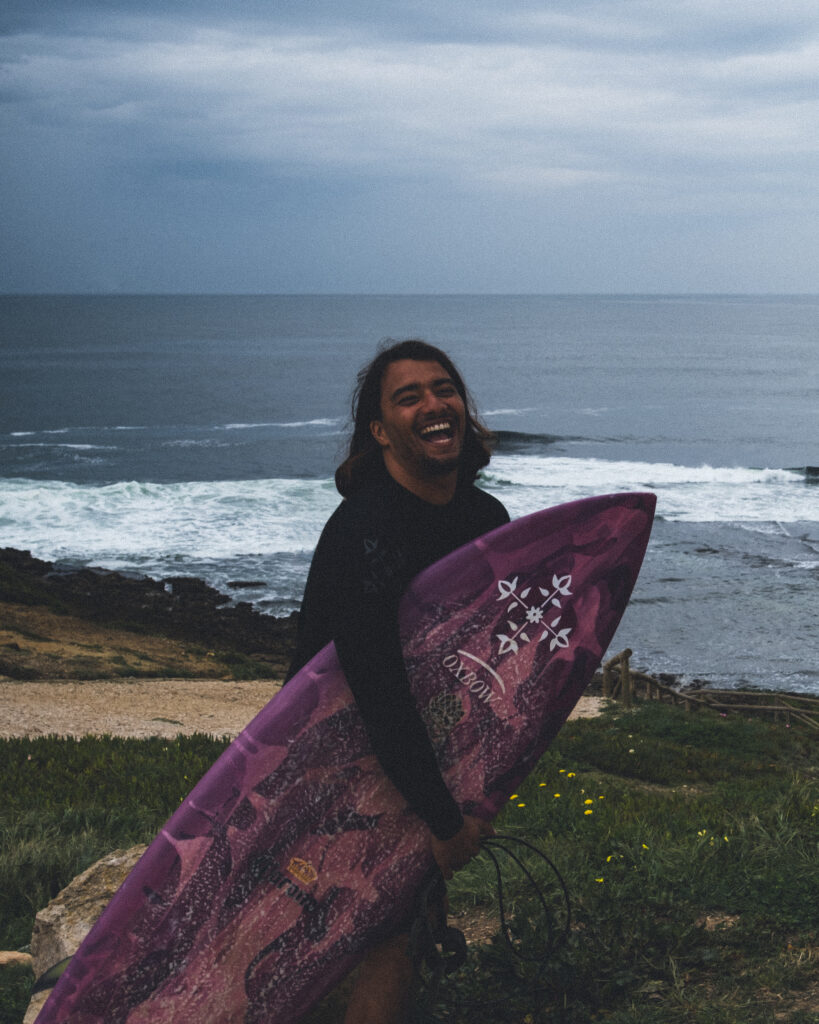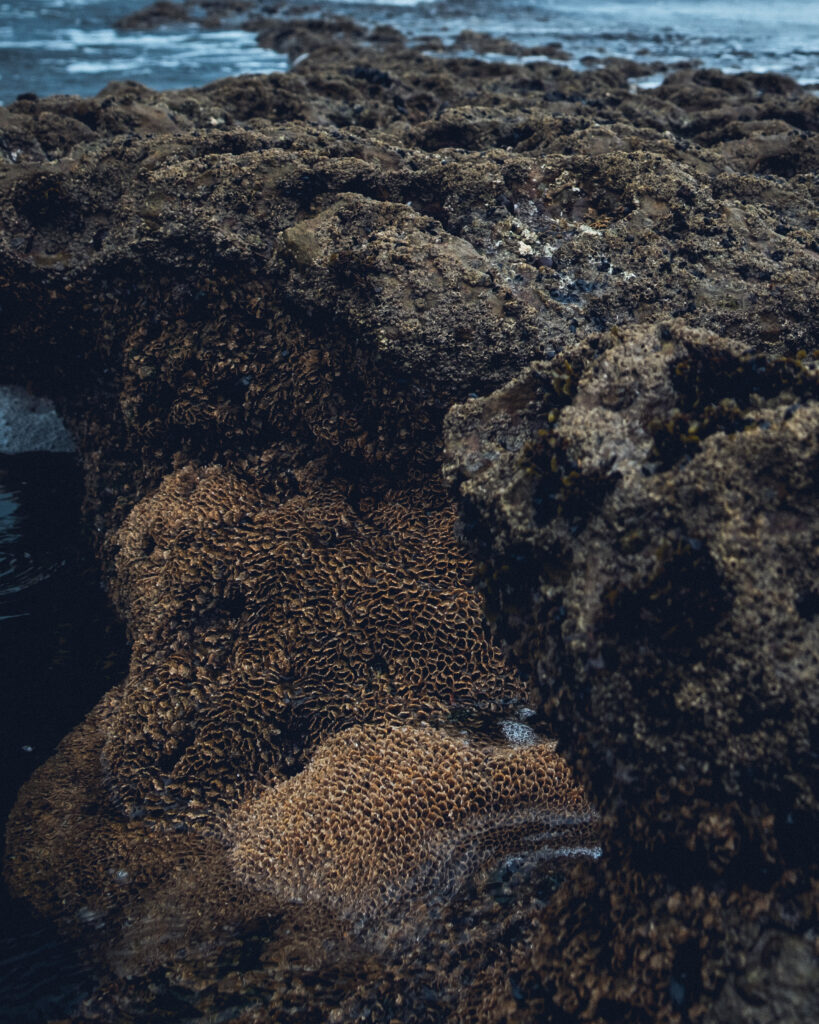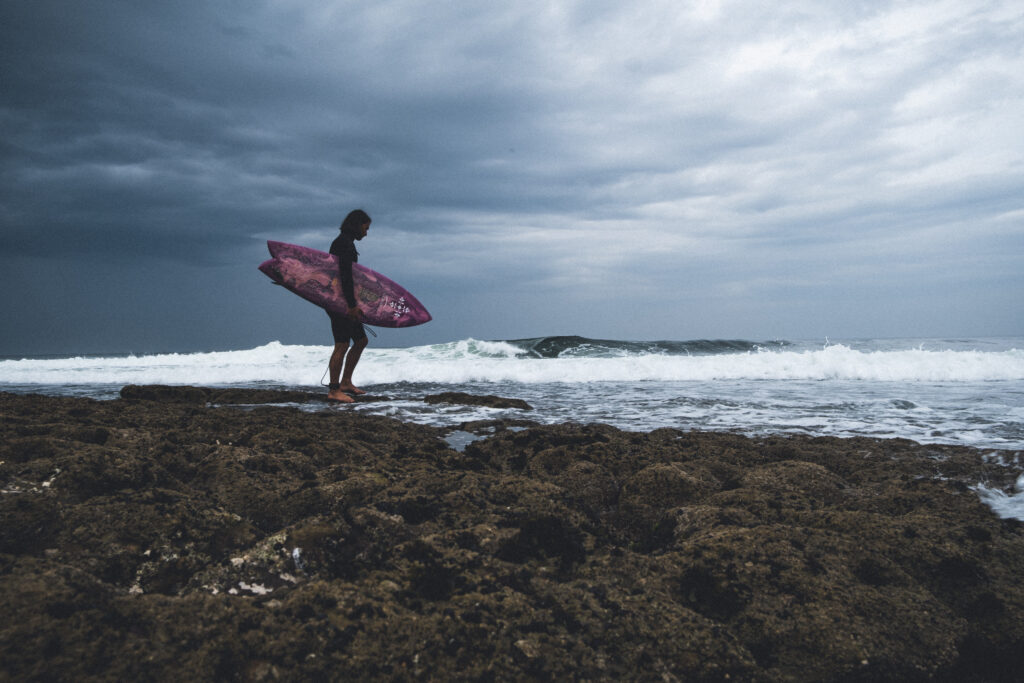Miguel Blanco on why good waves and a sustainable future require slowing down.
At just 29, Portuguese surfer Miguel Blanco has spent his life chasing waves and collecting stories from around the world. Born and raised on the coastline just outside of Lisbon, his lifelong passion for surfing began early, igniting a profound connection to the ocean. Beyond his career as a professional surfer, Miguel is a committed environmentalist and ocean advocate. As an ambassador for Save the Waves Coalition, SeaTrees and Sustainable Surf, he uses his voice and platform to raise awareness about ocean conservation and the importance of protecting the blue lungs of our planet. Writer Lukas Brunner sat down with Miguel at his home in Ericeira, overlooking the beautiful valley of Ribeira d’Ilhas, to talk about his experience and personal journey with environmentalism, the surf industry, how places and communities can change under the pressures of tourism, and the critical challenges – and solutions – that lie ahead.

LB: Hi Miguel, let’s jump right in. What does the ocean and surfing mean to you?
MB: I started surfing along the local coastline of Lisbon at seven years old, and it shaped my entire life. When I became a professional surfer at 10, the ocean gave me so many opportunities: travels, adventures, competitions, and connections with amazing people. It’s just really hard to imagine a life without it.
LB: Since you started surfing in Portugal and traveling the world, what environmental changes have you noticed in and around the ocean over the years?
MB: As you get older, you naturally notice more changes around you. Over the last decade, Portugal has experienced this massive tourism boom – there are just way more people around. More travelers, more surfers in the water. And it’s not just about surfers having to share waves – which can sometimes lead to tension between locals and tourists – it’s also about the broader impact: more people everywhere, more consumption–that just takes a toll on local communities, ecosystems, and nature. Seeing those negative effects firsthand really sucks. For me, that’s probably the hardest part – watching the place I grew up in shift so much. But yes, the ocean has changed dramatically. The fact is, there’s way less marine life in the water along the Portuguese coast than 20 to30 years ago, that’s obviously not only due to tourism, it’s climate change, overfishing, pollution, etc.
LB: Have you seen positive changes too?
MB: Yes, 100%. There are positive stories too. There are places where the water used to be clean and now it’s way more dirty, but there are also places where the water used to be way more dirty and now it’s way cleaner. This beautiful valley of Ribeira d’Ilhas that we are overlooking right now is a good example. If Save the Waves hadn’t stepped in, we might have a 15-story hotel or some exclusive golf course for rich people there. Instead, we have this beautiful public nature spot that is open to everyone to enjoy. So good and bad things are happening simultaneously. I just hope there are more people trying to save this planet than those who are fucking it up.
LB: How are you dealing with the change personally? I know myself, looking into all the issues surrounding climate change, it can really get to you. There’s even a word for it, Climate Dread.
MB: It’s hard, but I’m trying not to get too attached to it. Everyone leaves their footprint on this planet, and change happens whether we like it or not. What matters is how we respond and what we do to balance things out. It’s not just one person’s job – it’s everyone together: government, fishermen, surfers, tourists, local businesses, all of us. It’s everyone’s responsibility to take care of what we love.

LB: Was there a specific moment when you realized the ocean was truly under threat?
MB: In 2021, right after COVID, I went on a surf trip to the Maldives with my dad and brother. It was a special trip for me going together with them, getting out of the routine after being confined for months and months at home. On our first day at this beautiful wave called Cokes, we visited a nearby island that was completely covered in trash, like plastic everywhere! That was a turning point – seeing this paradise, with all its life under the water, overrun with waste, that really made me question myself. I gathered a little crew from our boat and we basically cleaned up the island as best as we could. That was the moment I felt I needed to take action as someone who has received so much from the ocean, I felt the need to do something as a human. Because, it’s not only the Maldivian people, not even the tourists, it’s everyone. If it wasn’t for humans, all that trash wouldn’t be there.
LB: It’s ironic but the pro surf and surf community in general is not yet that active in ocean conservation. Why do you think that is so?
MB: In many countries, and it’s sad to say, surfing is unfortunately a sport for the rich and privileged. People got used to a certain lifestyle, they got used to their regular surf trips and gear. Most might not be keen to let those things go.
There’s also a culture of individualism in surfing – people chase and get their waves somewhere around the globe and then leave without giving back to the local community or ocean, it’s rough. But we’re trying, you know. Especially with sustainable surfboards and wetsuits, there is more and more progress.
I really believe local surf clubs are a great step forward. They bring young people together and actually educate them, which is exactly what we need.
Surfing is unfortunately a sport for the rich and privileged. People got used to a certain lifestyle, they got used to their regular surf trips and gear. Most might not be keen to let those things go.
LB: Other older ocean industries have organized and mobilised. I’m thinking mostly about fishing. Federations, coalitions, unions. What would it look like if surfers united and had a political voice? Do you think it would be good and would it be realistic if surfing turned political?
MB: Just like any other ocean industry, the surf industry is adapting and making necessary changes, although there’s still a long way to go. It’s similar to the sports fishing industry, which is dealing with overfishing and evaluating the gear they use. Some are trying to change and adapt to more sustainable techniques and equipment, but it takes time.
The truth is you’ve got to start somewhere – it’s a process. I totally believe that it’s possible for the surf industry to change, not tomorrow but down the line, maybe in 10 or 20 years.
LB: As a professional surfer who travels the globe, do you ever feel conflicted about surfing’s environmental impact? Let’s be real—as a surfer myself, I know our sport isn’t exactly eco-friendly. From boards and wetsuits made with toxic materials to the carbon footprint of travel and tourism’s negative effects on coastal communities and pristine coastlines.
MB: That’s a complex question. We surfers love the ocean and depend on it so much for our overall happiness. It sounds silly, but it’s true, getting good waves just makes us happy, yet our equipment and travel habits aren’t very environmentally friendly.
After returning from the Maldives, I started rethinking my life and my choices while still pursuing my professional surfing career. I began working with Oxbow for their eco-friendly Yulex wetsuits, developed boards with recycled blanks and bio resin, and changed my travel patterns to take fewer flights. It’s not a perfect solution, but at least I’m taking steps in the right direction.
LB: How do you envision the future of surfing?
MB: As humans I really think we need to slow down. The way we’re living in a capitalist society is crazy. We don’t always need the new car or to go for another surf trip. I believe living slower and more simply is the way.
For now, I believe surfing equipment will become increasingly sustainable. We’ll have surfboards that last 10 to 20 years instead of being replaced every couple of years, which is already happening with innovative materials like Flax.
LB: Do you think professional surfers have a responsibility to advocate for environmental causes?
MB: Absolutely, 100%. If your life depends on the ocean, you have an extra responsibility to do something about it and use your influence positively. If there’s no ocean, there are no waves, and if there are no waves, there’s no surfing. We’re on the front lines of this issue.
LB: Speaking of channels for pro surfers to get involved with environmentalism, you work with Save the Waves Coalition. Can you tell us about the World Surfing Reserve here in Ericeira?
MB: When a location wants to become a World Surfing Reserve, they apply through Save the Waves Coalition. They create a management plan involving local government, surf clubs, nonprofits, and other stakeholders to address current challenges and prevent future ones. It brings together diverse perspectives – surfers, fishermen, restaurant owners, local families, people working in tourism – to preserve these special places. Here in Ericeira, this legal protection is ensuring that the natural beauty of this coastline is being secured.
World Surfing Reserves bring together diverse perspectives – surfers, fishermen, restaurant owners, local families, people working in tourism – to preserve these special places.
LB: Do sponsors incentivize and support their athletes in being active in environmentalism?
MB: It really depends on the brands you’re dealing with. In my experience, I’ve been lucky to work with brands that genuinely care about sustainability, so I’ve naturally stayed more connected to that side of things. But yeah, there are definitely other brands that don’t take it as seriously. The reality is, most brands are moving towards sustainability now, they have to, especially with the pressure that we, as environmentalists, have been trying to put on them. But like anything in business, it takes time. There’s a process, and things need to evolve.
LB: Do you think every surfer should be an environmental activist?
MB: I think everyone should be an environmentalist, not just surfers! Even the workers drilling oil in the middle of the ocean should be part of the solution. No one is perfect – this universe is perfectly imperfect. Not everyone can do everything – sustainable choices are often a luxury, a person from the lower class can’t afford a recycled/sustainable $300 jacket, that’s just impossible for a lot of people. It’s about finding balance. The activists need to show some compassion towards everyday people who face real-life issues, while society as a whole needs to put pressure on those in power to make sustainable choices more accessible to everyone.
LB: Despite all the negative news and challenges that we face, you seem optimistic about the future. Do we need optimism for creating change?
MB: I believe so. Optimism is also my way of dealing with it – if you focus only on the issues, you become overwhelmed, paralyzed, you end up getting nothing done. Instead, I try to focus on solutions. As my coach João Macedo taught me, rather than pointing fingers, show solutions. If you can positively influence one person today, another tomorrow, you create a chain reaction. The younger generation is already more aware than mine, and my generation is more aware than my parents’. We need to stay positive and be patient while continuing to push for change.
